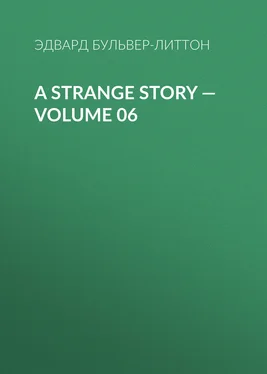Эдвард Бульвер-Литтон - A Strange Story — Volume 06
Здесь есть возможность читать онлайн «Эдвард Бульвер-Литтон - A Strange Story — Volume 06» — ознакомительный отрывок электронной книги совершенно бесплатно, а после прочтения отрывка купить полную версию. В некоторых случаях можно слушать аудио, скачать через торрент в формате fb2 и присутствует краткое содержание. Жанр: foreign_prose, literature_19, Европейская старинная литература, foreign_antique, на английском языке. Описание произведения, (предисловие) а так же отзывы посетителей доступны на портале библиотеки ЛибКат.
- Название:A Strange Story — Volume 06
- Автор:
- Жанр:
- Год:неизвестен
- ISBN:нет данных
- Рейтинг книги:5 / 5. Голосов: 1
-
Избранное:Добавить в избранное
- Отзывы:
-
Ваша оценка:
- 100
- 1
- 2
- 3
- 4
- 5
A Strange Story — Volume 06: краткое содержание, описание и аннотация
Предлагаем к чтению аннотацию, описание, краткое содержание или предисловие (зависит от того, что написал сам автор книги «A Strange Story — Volume 06»). Если вы не нашли необходимую информацию о книге — напишите в комментариях, мы постараемся отыскать её.
A Strange Story — Volume 06 — читать онлайн ознакомительный отрывок
Ниже представлен текст книги, разбитый по страницам. Система сохранения места последней прочитанной страницы, позволяет с удобством читать онлайн бесплатно книгу «A Strange Story — Volume 06», без необходимости каждый раз заново искать на чём Вы остановились. Поставьте закладку, и сможете в любой момент перейти на страницу, на которой закончили чтение.
Интервал:
Закладка:
Edward Bulwer-Lytton
A Strange Story — Volume 06
CHAPTER LIII
There is an instance of the absorbing tyranny of every-day life which must have struck all such of my readers as have ever experienced one of those portents which are so at variance with every-day life, that the ordinary epithet bestowed on them is "supernatural."
And be my readers few or many, there will be no small proportion of them to whom once, at least, in the course of their existence, a something strange and eerie has occurred,—a something which perplexed and baffled rational conjecture, and struck on those chords which vibrate to superstition. It may have been only a dream unaccountably verified,—an undefinable presentiment or forewarning; but up from such slighter and vaguer tokens of the realm of marvel, up to the portents of ghostly apparitions or haunted chambers, I believe that the greater number of persons arrived at middle age, however instructed the class, however civilized the land, however sceptical the period, to which they belong, have either in themselves experienced, or heard recorded by intimate associates whose veracity they accept as indisputable in all ordinary transactions of life, phenomena which are not to be solved by the wit that mocks them, nor, perhaps, always and entirely, to the contentment of the reason or the philosophy that explains them away. Such phenomena, I say, are infinitely more numerous than would appear from the instances currently quoted and dismissed with a jest; for few of those who have witnessed them are disposed to own it, and they who only hear of them through others, however trustworthy, would not impugn their character for common-sense by professing a belief to which common-sense is a merciless persecutor. But he who reads my assertion in the quiet of his own room, will perhaps pause, ransack his memory, and find there, in some dark corner which he excludes from "the babbling and remorseless day," a pale recollection that proves the assertion not untrue.
And it is, I say, an instance of the absorbing tyranny of everyday life, that whenever some such startling incident disturbs its regular tenor of thought and occupation, that same every-day life hastens to bury in its sands the object which has troubled its surface; the more unaccountable, the more prodigious, has been the phenomenon which has scared and astounded us, the more, with involuntary effort, the mind seeks to rid itself of an enigma which might disease the reason that tries to solve it. We go about our mundane business with renewed avidity; we feel the necessity of proving to ourselves that we are still sober, practical men, and refuse to be unfitted for the world which we know, by unsolicited visitations from worlds into which every glimpse is soon lost amid shadows. And it amazes us to think how soon such incidents, though not actually forgotten, though they can be recalled—and recalled too vividly for health—at our will, are nevertheless thrust, as it were, out of the mind's sight as we cast into lumber-rooms the crutches and splints that remind us of a broken limb which has recovered its strength and tone. It is a felicitous peculiarity in our organization, which all members of my profession will have noticed, how soon, when a bodily pain is once passed, it becomes erased from the recollection,—how soon and how invariably the mind refuses to linger over and recall it. No man freed an hour before from a raging toothache, the rack of a neuralgia, seats himself in his armchair to recollect and ponder upon the anguish he has undergone. It is the same with certain afflictions of the mind,—not with those that strike on our affections, or blast our fortunes, overshadowing our whole future with a sense of loss; but where a trouble or calamity has been an accident, an episode in our wonted life, where it affects ourselves alone, where it is attended with a sense of shame and humiliation, where the pain of recalling it seems idle, and if indulged would almost madden us,—agonies of that kind we do not brood over as we do over the death or falsehood of beloved friends, or the train of events by which we are reduced from wealth to penury. No one, for instance, who has escaped from a shipwreck, from the brink of a precipice, from the jaws of a tiger, spends his days and nights in reviving his terrors past, re-imagining dangers not to occur again, or, if they do occur, from which the experience undergone can suggest no additional safeguards. The current of our life, indeed, like that of the rivers, is most rapid in the midmost channel, where all streams are alike comparatively slow in the depth and along the shores in which each life, as each river, has a character peculiar to itself. And hence, those who would sail with the tide of the world, as those who sail with the tide of a river, hasten to take the middle of the stream, as those who sail against the tide are found clinging to the shore. I returned to my habitual duties and avocations with renewed energy; I did not suffer my thoughts to dwell on the dreary wonders that had haunted me, from the evening I first met Sir Philip Derval to the morning on which I had quitted the house of his heir; whether realities or hallucinations, no guess of mine could unravel such marvels, and no prudence of mine guard me against their repetition. But I had no fear that they would be repeated, any more than the man who had gone through shipwreck, or the hairbreadth escape from a fall down a glacier, fears again to be found in a similar peril. Margrave had departed, whither I knew not, and, with his departure, ceased all sense of his influence. A certain calm within me, a tranquillizing feeling of relief, seemed to me like a pledge of permanent delivery.
But that which did accompany and haunt me, through all my occupations and pursuits, was the melancholy remembrance of the love I had lost in Lilian. I heard from Mrs. Ashleigh, who still frequently visited me, that her daughter seemed much in the same quiet state of mind,—perfectly reconciled to our separation, seldom mentioning my name, if mentioning it, with indifference; the only thing remarkable in her state was her aversion to all society, and a kind of lethargy that would come over her, often in the daytime. She would suddenly fall into sleep and so remain for hours, but a sleep that seemed very serene and tranquil, and from which she woke of herself. She kept much within her own room, and always retired to it when visitors were announced.
Mrs. Ashleigh began reluctantly to relinquish the persuasion she had so long and so obstinately maintained, that this state of feeling towards myself—and, indeed, this general change in Lilian—was but temporary and abnormal; she began to allow that it was best to drop all thoughts ofa renewed engagement,—a future union. I proposed to see Lilian in her presence and in my professional capacity; perhaps some physical cause, especially for this lethargy, might be detected and removed. Mrs. Ashleigh owned to me that the idea had occurred to herself: she had sounded Lilian upon it: but her daughter had so resolutely opposed it,—had said with so quiet a firmness "that all being over between us, a visit from me would be unwelcome and painful,"—that Mrs. Ashleigh felt that an interview thus deprecated would only confirm estrangement. One day, in calling, she asked my advice whether it would not be better to try the effect of change of air and scene, and, in some other place, some other medical opinion might be taken? I approved of this suggestion with unspeakable sadness.
"And," said Mrs. Ashleigh, shedding tears, "if that experiment prove unsuccessful, I will write and let you know; and we must then consider what to say to the world as a reason why the marriage is broken off. I can render this more easy by staying away. I will not return to L—— till the matter has ceased to be the topic of talk, and at a distance any excuse will be less questioned and seem more natural. But still—still—let us hope still."
Читать дальшеИнтервал:
Закладка:
Похожие книги на «A Strange Story — Volume 06»
Представляем Вашему вниманию похожие книги на «A Strange Story — Volume 06» списком для выбора. Мы отобрали схожую по названию и смыслу литературу в надежде предоставить читателям больше вариантов отыскать новые, интересные, ещё непрочитанные произведения.
Обсуждение, отзывы о книге «A Strange Story — Volume 06» и просто собственные мнения читателей. Оставьте ваши комментарии, напишите, что Вы думаете о произведении, его смысле или главных героях. Укажите что конкретно понравилось, а что нет, и почему Вы так считаете.












